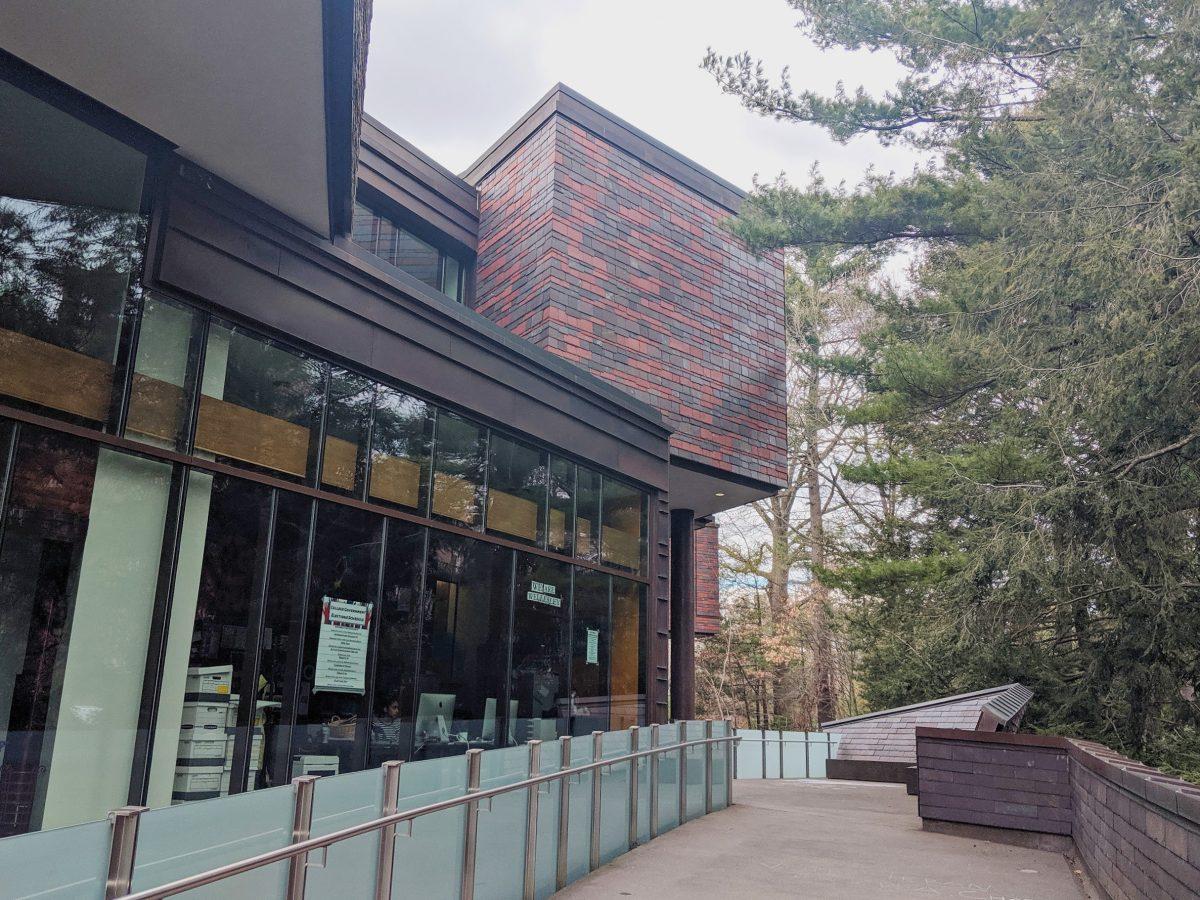College Government (CG) is holding an election for nine open positions this week on Tuesday, March 23 from 8 a.m. to 8 p.m. EST. The Wellesley News sat down with each candidate to discuss their reasons for running, main policy changes, and visions for the future of Wellesley. As of Mar. 22, there is no candidate running for organizations chair.
Udita Bajaj ’22 (she/her), College Government President Candidate

Presidential candidate Udita Bajaj ’22 seeks to engage with and learn more about the Wellesley community. As a Ministrare Fellow, Albright Fellow and Presidential Scholar, she said she lives by the motto, “Be bold, be brave, be vulnerable.”
For Bajaj, the themes of vulnerability and willingness to challenge oneself shows in her campaign motifs, which include a peacock feather. Bajaj was in a severe accident in 2006, resulting in a permanent neurological disability that affects her motor skills. For fifteen years she could not draw, but recently she drew a peacock feather.
To her, being the College Government President is about “literally being a call away.”
“It’s being so accessible and making this space between you and the Wellesley students comfortable enough that they can approach you with anything,” Bajaj said.
Her main concerns are gathering data to improve mental health care through a comprehensive anonymous survey and bridging the gap between College Government and student organizations and between the student body and the administration. Additionally, Bajaj hopes to begin the process of decolonizing the Davis Museum by examining pieces that may have been stolen and collaborating with professors, the administration and students to open up a conversation. She also places an emphasis on spending time to create experiences the Class of 2024 may have missed in order to help connect the community and continue the Wellesley College legacy.
Giselle Mota ’22 (she/her), College Government President Candidate

Giselle Mota ’22 is a Presidential candidate who seeks to improve the student experience on campus by speaking out about on-campus activism efforts and what she described as “sometimes less than positive experiences” at Wellesley. According to Mota, she hopes to utilize the role of President to put students in conversation with the administration, which is why she wants to make College Government more accessible to the average student by being a bigger presence on campus.
While Mota does not have prior CG experience, she was the student body president of her high school. She believes that being new to CG allows her to bring in a new perspective, although she anticipates having to put more time into acquainting herself with the unique processes and terminology.
“I’m really hoping to bring that kind of other side to College Government and freshen things up,” Mota said.
Mota is motivated by the idea of diversifying what student experiences are spoken about and validating those experiences, which may not contribute to the image of a nearly issue-free college. According to Mota, she holds herself to authenticity even when it “isn’t pretty.” She offers a variety of experiences in different parts of the College, including through civic engagement, volunteering, cultural organizations and societies. Through this, Mota hopes to be able to speak out for her fellow students.
She plans to navigate the “three-way street” of students, CG and the administration by working with the College Government to make the wants and needs of the student body clear to the administration.
Francesca Lameiro ’23 (they/them and she/her), College Government Vice President Candidate
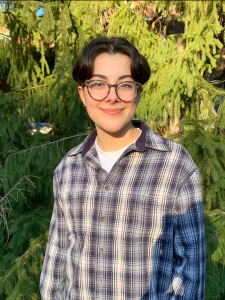
Francesca Lameiro ’23 is the only College Government Vice Presidential candidate. They served as a Claflin senator and are currently the Severance executive senator. They decided to run because they believe they can make a difference and want to listen to students and ensure that a diverse range of voices represents the campus.
They are passionate about the work Appointed Representatives Committee (ARC) does to improve student life by appointing student representatives to Committees, which is one of the primary responsibilities of the Vice President. Their focus on ARC stems from the belief that students need to utilize the power to access behind-the-scenes decisions to improve college life.
“If I can leave Wellesley having made this specific committee [ARC], that actually improves student life sometimes, a bit better, then I think that’s a worthwhile impact,” Lameiro said. “I wanted to be a part of that mission of using student power for good.”
In addition to their interest in ARC, they want to improve bureaucratic aspects to increase accessibility for average students, particularly by improving the College Government website.
Ingrid Bell ’24 (she/her), College Government Secretary-Treasurer Candidate
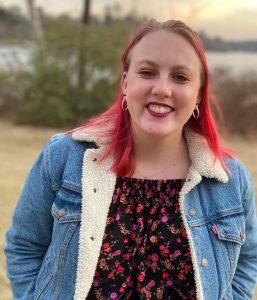
Ingrid Bell ’24 is running for Secretary-Treasurer. As a first-year getting involved as a Stone Davis senator, she wanted to make it easier for fellow sibs to do the incredible things she saw happening due to the “kindness and passion and dedication of everyone at Wellesley.” This led her to the Sec-Treas position, which she hopes to use to facilitate communication and interaction between College Government and the community.
“I want to become Secretary-Treasurer so that I can basically create better ways for us to communicate with the student body at large, so that everyone knows what’s going on, because knowing what’s going on, being informed, is the first step to becoming involved,” Bell said.
Bell plans to achieve increased communication through revamping the College Government website, utilizing social media more, continuing the Senate meeting emails and creating infographics and ways for students to easily understand the branches and structure of college government.
Julianna Kenny-Serrano ’22 (she/her), Chief Justice Candidate

In the uncontested race for Chief Justice, Julianna Kenny-Serrano ’22 hopes to bring her experience as Deputy Chief Justice and insight on the Honor Code to the Wellesley community.
“I’ve gotten a lot more clarity in the many ways in which the Honor Code is failing to address the needs that students have, and just the general Wellesley community as a whole,” she said of her two-year tenure on the Council.
According to Kenny-Serrano, her campaign is focused on reducing the punitive aspects of the Honor Code, increasing student body understanding of the Honor Code Council through campus infographics and anonymous student Q&A platforms, expanding recruitment efforts and holding office hours to integrate student input.
Kenny-Serrano hopes to eliminate the presence of campus police at Honor Code hearings regarding reports written up by officers, calling the current practice “a symbolic presence” that fails to contribute useful information to the hearing panel. Kenny-Serrano also hopes to eliminate the Honor Code hearing recommendation that one-third of a hearing outcome be punitive, adding that it is “completely inappropriate.”
“That’s a huge percentage of the outcome that is shaped by this innate desire to have something be punitive,” Kenny-Serrano said. “I really don’t think the community’s needs align with that anymore or — frankly, that the ethics of what Wellesley should be — require that.”
Maya Bradbury ’22 (she/her), Student Bursar Candidate
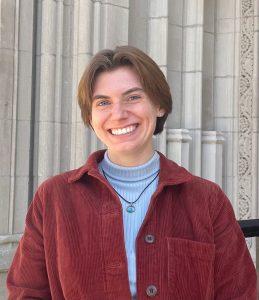
Maya Bradbury ’22 is the sole candidate running for Student Bursar. Currently serving as a bookkeeper for the Student Organization Funding Committee (SOFC), Bradbury joined the organization in her first week at Wellesley.
“I have really loved my time with SOFC and the Bursar’s Office, and I have a lot of really great ideas and things that I would love to change to make SOFC better,” Bradbury said. “As a candidate, I am super dedicated to this role and this position and being able to build the community.”
If elected, Bradbury hopes to increase SOFC funding availability to individual students and unconstituted student organizations, promote open communication between organization treasurers and SOFC bookkeepers and expand Guaranteed Percentage funding — which allocates a set percentage of SOFC’s budget to student groups that serve an essential function at Wellesley — to student organizations that host campus-wide events such as cultural shows.
Bradbury also hopes to engage more students in SOFC’s funding decisions. According to the Wellesley College Government Constitution, the students employed by SOFC hold sole responsibility for the allocation of the Student Activity Fund.
“SOFC is so important in how we can shape our community, and how we as students can all decide what happens with our money,” Bradbury said. “That’s up to every single person on this campus, so I really hope to be an arbiter of that and really let people decide how they want their funding to be used, rather than having me dictating what happens with it.”
Faith Carbajal ’23 (she/her), Chair of the Committee for Political and Legislative Awareness (CPLA) Candidate
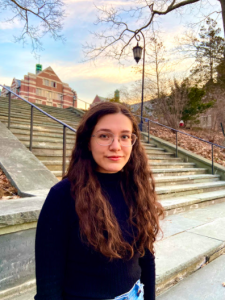
There are two candidates running to chair the Committee for Political and Legislative Awareness (CPLA): Faith Carbajal ’23 and Michelle Lee ’23.
According to her statement of intent (SOI) for CPLA Chair, Faith Carbajal ’23 has served on CPLA since her first year as the CPLA dorm representative for Tower Court and later served on the committee’s executive board as the discussion chair and treasurer.
Carbajal’s SOI details her plans to increase student body outreach through creating political education infographics and restructuring the CPLA executive board to include a newsletter chair, a communications committee and an international politics subcommittee. Carbajal also plans to diversify political conversations within CPLA by hosting more international political discussions.
The Wellesley News reached out to Carbajal, who declined to be interviewed.
Michelle Lee ’23 (she/her), Chair of the Committee for Political and Legislative Awareness (CPLA) Candidate
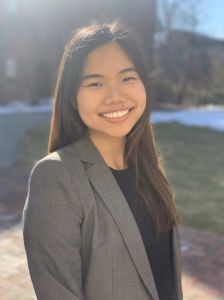
Lee joined CPLA her first year as a dorm representative and currently holds the position of CPLA communications chair, managing social media posts and website updates for the organization. From her experience, Lee hopes to increase engagement with less politically active students and restructure CPLA roles to include a newsletter chair position and encourage more representatives from other student organizations to join CPLA.
“I want to be hearing everyone’s voices, and I want to focus on outreach,” Lee said. “That means creating fun, engaging events with people that are not as politically active starting off. I think CPLA right now caters more towards very politically active students, and I want to change that because we really should be for everyone.
Citing her experience as a general member and board member of CPLA, Lee believes she is qualified to serve as chair.
“I work hard in everything I do,” Lee said. “I’m passionate, I’m on top of things. I do have my priorities straight, and I can get my goals done, but also I just want to be an approachable person. Anyone can feel free to talk to me, and I will use my voice to fight for the concerns for everyone on campus. I have my listening ears open.”
Imogene Johnson ’22 (she/her), Director of On-Campus Affairs (DOOCA) Candidate
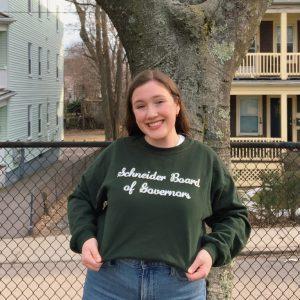
In an uncontested race for Director of On-Campus Affairs (DOOCA), Imogene Johnson ’22 plans to bring her previous experiences in the Schneider Board of Student Governors (SBOG), where she served as board secretary and was a member of the party and publicity committees, to improve the organization.
If elected, Johnson said she would prioritize diversity within SBOG, focusing specifically on event planning, collaborating with other campus organizations, as well as creating more accessible ways for students to give the DOOCA feedback.
Johnson also acknowledged that the DOOCA role would face special COVID-19-related restrictions to navigate in the upcoming school year.
“Looking to the year ahead, it is still a little unclear what events might look like and what campus might look like,” she said. “I’m prepared for the challenge to advocate for students and what they want in terms of events and ensure that there is still a social scene on campus.”
As DOOCA, Johnson hopes to prioritize all students’ experiences by listening to feedback.
“I can offer the Wellesley community a listening ear,” Johnson said. “I want everyone to feel like there is an event they look forward to.”
Write-in: Deeva Scott ’22 (she/her), Community Organizing and Inclusion Liaison Candidate
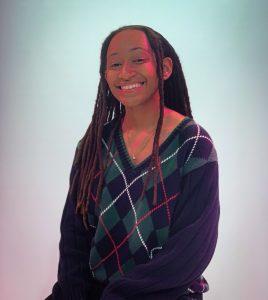
Deeva Scott ’22 is running a write-in campaign as the only candidate for Community Organizing and Inclusion Liaison (COIL). Scott plans to take her involvement in different community spaces — including SBOG, College Government Senate and res life — on campus into the COIL role. To vote for Scott write in “Deeva” or COIL.
Scott believes her experience as a student assistant to College President Paula Johnson’s office gives her a strong understanding of how the administration engages with students. Being elected would allow her to more effectively enact change on campus.
If elected, Scott aims to build mutual trust between students and the administration and hold conversations with marginalized students to support their concerns. From her strong sense of community at Wellesley, Scott is motivated to provide that same sense of belonging for each student.
“I’m a Black woman, and I’m a first-generation student, and I’m a low-income student, so I know how difficult it can be for those intersecting identities to exist at Wellesley,” Scott said. “Even though I’ve been thankful enough to find so much support and love in our community, I also understand that there are a lot of infrastructural changes that need to happen.”
Scott also plans to prioritize students’ efforts to organize protests. Acknowledging the difficulties in navigating campus activism when faced with the College’s administration, she said, “I believe that the frustration that I may feel from that will only drive me.”
Aside from her experience, Scott also believes she has the skillset to take on the COIL role.
“I’m so passionate and I’m so ready to occupy this position,” she said. “I’m a great listener, and what I think is key to the COIL position is that I don’t listen just to react — I listen to understand and connect and synthesize to really try to make a space where you feel comfortable.”

